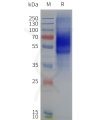CRHR1/CRFR1 recombinant proteins and antibodies
Corticotropin-releasing factor receptor 1 (CRFR1), also known as Corticotropin-Releasing Hormone Receptor 1 (CRHR1) is a member of the corticotropin-releasing hormone receptor family and a G protein-coupled receptor (GPCR). It is primarily expressed in the brain, adrenal glands, and immune system, playing a crucial role in regulating the body’s response to stress. CRHR1, upon binding to corticotropin-releasing hormone (CRH), initiates a series of signaling pathways that regulate stress responses, immune reactions, inflammation, and hormone levels. It plays a central role in regulating the body’s response to stress and is closely associated with several neuropsychiatric disorders, including depression, anxiety, post-traumatic stress disorder (PTSD), and obsessive-compulsive disorder (OCD).
Research has shown that abnormal activation of CRHR1 is closely linked to the onset and development of these psychiatric disorders. In patients with anxiety and depression, CRHR1 dysfunction may lead to an imbalance in neurotransmitters and overactivation of stress responses, which exacerbates the condition. Therefore, targeting CRHR1 with drugs has become an important direction in the treatment of psychiatric diseases. Currently, ongoing drug development targeting CRHR1 mainly focuses on the development of antagonists. CRHR1 antagonists aim to alleviate anxiety, depression, and stress-related symptoms by inhibiting the excessive activation of CRHR1. Unlike other antidepressants, CRHR1 antagonists directly regulate stress hormone levels, offering potentially more effective treatments, particularly for patients who do not respond well to conventional antidepressant therapies.
Several biopharmaceutical companies are actively engaged in the development of CRHR1-targeted drugs. Allergan in the United States is developing a CRHR1 antagonist as a potential treatment for anxiety and depression. This drug works by blocking the binding of CRHR1 to its agonist, CRH, thereby reducing excessive stress responses and improving emotional regulation. Additionally, major pharmaceutical companies such as Pfizer and Johnson & Johnson are advancing research into CRHR1-related drugs, especially for the treatment of PTSD and anxiety disorders. Allergan’s CRHR1 antagonist is currently in preclinical research, with early clinical trials expected to begin in the coming years. Johnson & Johnson is exploring multiple CRHR1-related therapies and plans to conduct clinical studies on PTSD treatment. Meanwhile, Pfizer is focusing on CRHR1 antagonists for the treatment of depression and anxiety, with clinical trials expected to begin in the next few years. As research into CRHR1 receptors deepens, more innovative drugs are expected to enter the market, especially in the field of stress-related psychiatric disorders. The development of CRHR1-targeted drugs not only provides more treatment options but also brings new hope to patients suffering from long-term psychiatric disorders.
To assist in the development of drugs targeting CRHR1, DIMA BIOTECH can now provide full-length CRHR1 recombinant membrane protein developed by its nanodisc membrane protein platform. CRHR1 nanodisc is an optimal solution for screening small molecules targeting CRHR1 with its natural structure. Furthermore, DIMA BIOTECH has also prepared a CRHR1 single B cell seed library, from which lead antibody molecules can be obtained in as fast as 28 days.
Full Length Transmembrane Proteins
SKU: FLP120228 Target: CRHR1 Tag: C-Flag&Strep Tag
Price: 10 μg $810.00 ; 50 μg $3960.00 ; 100 μg $7200.00
Full Length Transmembrane Proteins
SKU: FLP100228 Target: CRHR1 Tag: C-Flag Tag
This product is no longer available. Click here to view recommended products


